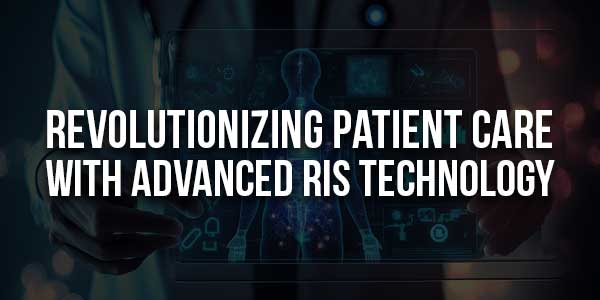
In today’s fast-paced medical landscape, technology is a driving force behind innovative patient care solutions. It bridges gaps, enhances efficiency, and improves outcomes. For healthcare professionals, staying abreast of technological advancements isn’t just beneficial—it’s essential. This blog post explores how Radiology Information System (RIS) technology enhances patient care and transforms healthcare practices.
Table of Contents
Understanding RIS (Radiology Information System) Technology
Radiology Information System (RIS) technology is a specialized database for managing medical imagery and associated data. It’s integral to radiological practices, providing a unified platform for scheduling, tracking, and interpreting imaging studies. By centralizing and streamlining these processes, RIS technology ensures that radiologists, technologists, and other healthcare professionals can focus more on patient care and less on administrative tasks.
The Evolution Of RIS In Enhancing Patient Care:
RIS technology has come a long way since its inception. Initially, it served as an essential scheduling tool. However, today’s advanced RIS systems offer sophisticated functionalities such as image archiving, detailed reporting, and seamless integration with other healthcare systems like Electronic Health Records (EHR). This evolution reflects the growing need for comprehensive, interconnected healthcare solutions. Modern RIS technology supports accurate diagnoses and timely interventions by providing real-time access to patient data.
Benefits Of Implementing Cutting-Edge RIS Technology:
Improved Diagnostic Accuracy:
One of the primary benefits of cutting-edge RIS technology is improved diagnostic accuracy. Advanced RIS systems offer precise tools for image analysis and interpretation, reducing the margin for error. They also provide comprehensive patient history, allowing for a more informed diagnostic process. Better patient outcomes and a more streamlined workflow for radiologists result.
Enhanced Workflow Efficiency:
RIS technology significantly enhances workflow efficiency in radiological departments. By automating routine tasks such as appointment scheduling and reporting, RIS systems save healthcare professionals valuable time. It enables a greater focus on patient care and reduces time spent on administrative tasks. Additionally, integrating RIS with other systems ensures seamless data flow, reducing delays and improving overall departmental efficiency.
Better Patient Communication:
Effective communication is key to quality patient care. RIS technology facilitates better patient communication by providing detailed, accessible reports. Patients can receive timely updates on their imaging studies and treatment plans, fostering transparency and trust. Furthermore, the centralized nature of RIS systems ensures that all relevant healthcare providers have access to the same information, promoting coordinated care.

Challenges And Considerations In Adopting RIS Technology:
High Initial Costs:
Despite the numerous benefits, adopting RIS technology has challenges, one of the most significant being high initial costs. Implementing an advanced RIS system requires a substantial investment in hardware and software. Additionally, there may be costs associated with training staff to use the new system effectively. However, many healthcare professionals find that the long-term benefits, such as increased efficiency and improved patient care, outweigh these initial expenses.
Integration with Existing Systems:
Another challenge is integrating RIS technology with existing systems. Many healthcare facilities already have established EHR and PACS (Picture Archiving and Communication System) systems. Ensuring compatibility and seamless data flow between these systems and a new RIS can be complex. It’s crucial to work with experienced vendors and IT professionals to streamline this integration process and avoid potential disruptions to patient care.
Data Security Concerns:
Data security has become a paramount concern in healthcare with the increasing reliance on digital systems. RIS systems store sensitive patient information, making them potential targets for cyberattacks. Healthcare professionals must ensure that their RIS technology incorporates robust security measures, such as encryption and regular security audits, to protect patient data. Healthcare facilities can maintain patient trust and comply with regulatory requirements by prioritizing data security.
Future Trends In RIS And Healthcare Technology:
AI And Machine Learning Integration:
The future of RIS technology looks promising, with advancements in artificial intelligence (AI) and machine learning set to revolutionize the field. AI-powered RIS systems can analyze vast amounts of imaging data quickly and accurately, assisting radiologists in making precise diagnoses. Machine learning algorithms can also identify patterns and trends in patient data, leading to more personalized and effective treatment plans.
Tele-Radiology:
Tele-radiology is another emerging trend in the healthcare industry. With the integration of RIS technology, radiologists can remotely access and interpret imaging studies from anywhere in the world. This expands access to specialized care and ensures timely diagnoses and interventions, particularly in underserved areas. Tele-radiology, combined with advanced RIS systems, has the potential to significantly improve patient outcomes on a global scale.
Enhanced Patient Engagement:
Future RIS technology will likely place a greater emphasis on patient engagement. Patients are increasingly taking an active role in their healthcare, and advanced RIS systems can support this trend by providing patients with easy access to their imaging studies and reports. Patient portals and mobile apps integrated with RIS technology can foster better communication, enabling patients to stay informed and engaged in their treatment plans.
In conclusion, advanced RIS technology is a game-changer in the healthcare industry, offering numerous benefits such as improved diagnostic accuracy, enhanced workflow efficiency, and better patient communication. However, healthcare professionals must consider challenges like high initial costs, system integration, and data security. By staying informed about future trends and advancements in RIS technology, healthcare professionals can continue to provide top-notch patient care and maintain a competitive edge in the industry.
For healthcare professionals looking to explore the potential of RIS technology further, partnering with experienced vendors and staying updated on the latest developments is essential. Integrating advanced RIS technology into healthcare practices holds the promise of revolutionizing patient care and improving outcomes for all.

 About the Author:
About the Author:
















Be the first to write a comment.